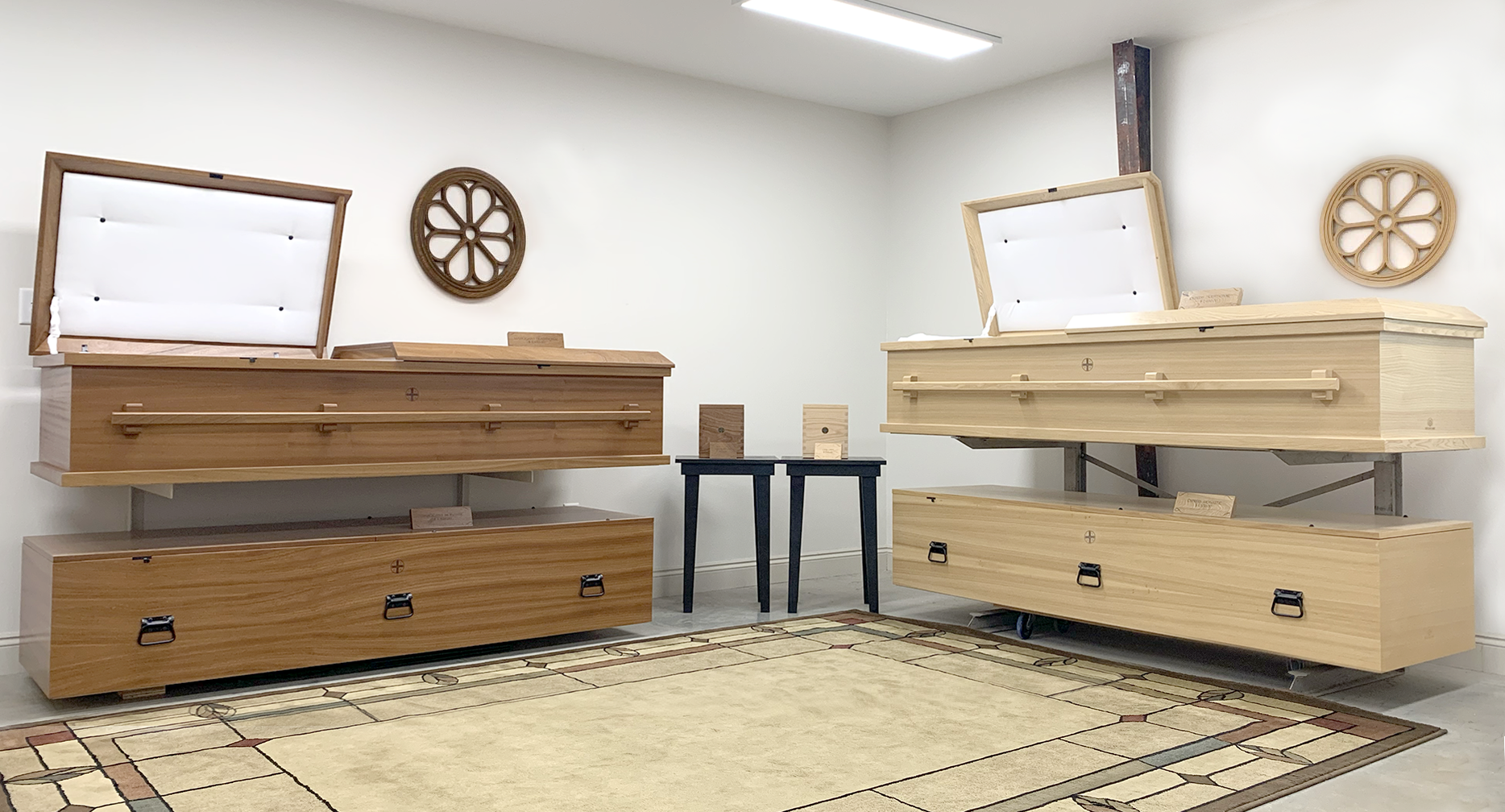
ABOUT SAINT JOSEPH ABBEY CASKETS
“If there are artisans in the monastery, they are to practice their craft with all humility...”
- Rule of Saint Benedict, Chapter 57

Saint Joseph Abbey Caskets Continues to Grow
Saint Joseph Abbey Caskets could not be successful without the dedicated employees and volunteers (not all shown here). Deacon Mark Coudrain, top left, manages Saint Joseph Abbey Caskets.
Business Flourishes at Saint Joseph Abbey Caskets After Court Battle Over Right to Sell Caskets
The monks of Saint Joseph Abbey have always crafted a simple wooden casket for a community member upon his death. Through the years, other clergy members and church officials have been buried in one of the handcrafted caskets. In the 1990s, the public began requesting caskets for deceased loved ones.
It wasn’t until 2007, however, that the Abbey turned an occasional coffin construction project into a business. That’s when Deacon Mark Coudrain, a woodworking enthusiast, approached Abbot Justin Brown with the idea. The monks prayed about it, saw potential in the demand and invested $200,000 to begin Saint Joseph Woodworks, with Coudrain as its manager.
The business plan was simple. Saint Joseph Woodworks would offer a cypress casket in two models, the traditional for $2,000 and a monastic for $1,500. Caskets would be built in the cafeteria at Camp Abbey.
In November 2007, Saint Joseph Woodworks officially began building caskets for sale to the general public to support the monks’ educational and healthcare expenses. But one month later, the Louisiana State Board of Embalmers and Funeral Directors ordered the Abbey not to sell the caskets to the public within the state, citing a state law that required sellers of caskets to have funeral director training and to have a funeral parlor with embalming equipment.
A SIX-YEAR BATTLE
The Abbey stopped advertising the sale of caskets and tried twice to get the state Legislature to change the law to allow non-profit charitable groups such as the Abbey to sell caskets. When both tries failed, the Abbey, with the help of the Institute of Justice, filed a federal lawsuit challenging Louisiana’s law as a violation of due process and equal protection.
U.S. District Judge Stanwood Duval ruled in favor of the Abbey in 2011. The board of funeral directors then appealed to the 5th Circuit Court of Appeals, and in March 2013 the Fifth Circuit unanimously affirmed the lower court's decision that the Louisiana embalmers and funeral directors board wrongly required casket sales to be conducted only through a state-licensed funeral director at a funeral home.
The State Board filed a petition seeking a hearing before the U.S. Supreme Court, but in October 2013, the court denied that petition.
Following the court victory, Abbot Justin told the New Orleans Times Picayune that when the monks started making and selling the caskets in 2007, they had no idea they were breaking a state law. He said throughout the legal saga they had received a tremendous amount of support from the public and received a lot of requests for caskets. The court battle gave St. Joseph Abbey more publicity than they ever could have imagined, he said.
GROWTH AND CHANGE
The Archdiocese of New Orleans leased Camp Abbey in 2011, and Saint Joseph Woodworks left the camp and moved to a newly constructed building on the Abbey grounds.
Casket production continued to increase – from about two caskets a week in 2007 to 20 a month by 2011 and 30 a month in 2019. In 2023, more than 400 caskets were sold and delivered. Cremation urns, which were produced in small numbers in 2007, also continued to grow in popularity.
Eventually Saint Joseph Woodworks became Saint Joseph Abbey Caskets, and another expansion became necessary. An old maintenance building located adjacent to the current workshop, which originally served as a seminary dorm prior to 1960, was re-purposed to house new equipment, store the increased supply of finished caskets, and provide space for a showroom. On March 19, 2021, the Feast of Saint Joseph, the monastic community joined Abbot Justin and Deacon Mark for the blessing of the new Caskets building expansion.
Caskets are now available in two woods, cypress and mahogany. Traditional caskets are $2,650 plus tax, and monastic caskets are $1,950 plus tax. Urns are available in mahogany and oak and cost $350 plus tax. Urns can be purchased from the Casket office or the Saint Joseph Abbey Gift Shop.
Monks, attorneys from the Institute of Justice, and supporters in front of the Fifth Circuit Court.
WANT TO LEARN MORE
ABOUT ABBEY V. CASTILLE?
The six-year legal battle was widely publicized in newspapers and media outlets throughout the country. You can read some of those reports at the following links:

















